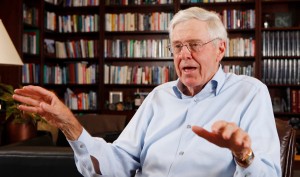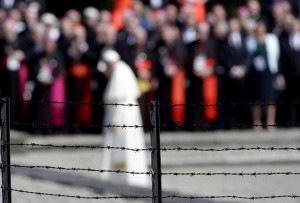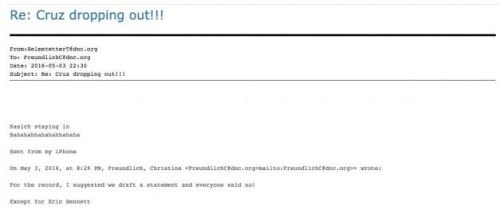OSWIECIM, Poland (AP) -- Choosing silence to convey his sorrow, Pope Francis visited the former Nazi death factory at Auschwitz and Birkenau on Friday, meeting with concentration camp survivors as well as aging saviors who helped Jews escape certain doom. In a guest book entry he made an anguished plea: “Lord, forgiveness for so much cruelty!”
Wearing unadorned white robes, Francis entered Auschwitz on foot, passing through the gate that bears the cynical words “Arbeit Macht Frei” -- Work Sets You Free.
One by one, he greeted 11 survivors, among them 101-year-old Helena Dunicz Niwinska, who played the violin in a death camp orchestra, and two other centenarians. One survivor, Valentina Nikodem, helped deliver babies born to Auschwitz inmates.
Elzbieta Sobczynska, who was 10 when she was brought to Auschwitz in 1944 from the Warsaw ghetto, said that in his silence, Francis spoke volumes.
“You don’t need words. Prayer was enough,” Sobczynska said, speaking to Poland’s TVN24.
Francis, she said, “came here with humility, he came here to find the shadows of those who were stripped of the most precious thing -- life.”
The pope then traveled to nearby Birkenau, a sprawling complex where people were murdered in factory-like fashion in its gas chambers.
There he greeted 25 Holocaust rescuers, including Anna Bando, who as a child helped her mother smuggle bread hidden in their handbags to Jews forced by Nazi occupiers to stay in Warsaw’s ghetto.
Francis’ visit to Auschwitz-Birkenau, where Adolf Hitler’s forces put to death more than 1 million people, most of them Jews, came on the third day of a five-day trip to Poland that included meetings with young Catholic pilgrims gathering in Krakow for World Youth Day, a global celebration of faith.
Except for the brief exchange with the survivors and rescuers, Francis spent his nearly two hours at the death camps in quiet prayer and reflection.
The pope wanted an “atmosphere of silence, silent compassion, silent prayer,” said Vatican spokesman, the Rev. Federico Lombardi.
His only public words were in a guest-book entry, where he wrote in his native Spanish: “Lord, have mercy on your people! Lord, forgiveness for so much cruelty!” He then signed his name in Latin, “Franciscus.”
Later, however, Francis spoke with passion about his Auschwitz visit to a crowd of young people gathered outside the archbishop’s residence where he was staying for the night.
“How much pain! How much cruelty! Is it possible that we humans created in God’s image are capable of doing these things?” the pontiff said of the atrocities 70 years ago.
Then he added: “I don’t want to make you bitter, but I have to say the truth. Cruelty did not end in Auschwitz, in Birkenau. Even today … people are being tortured. Many prisoners are tortured, just to make them talk.”
“Today in many parts of the world where there is war the same thing is happening.”
Francis is the first pope to visit Auschwitz who did not himself live through the brutality of World War II on Europe’s soil.
Unlike his predecessors, St. John Paul II and Benedict XVI, who were young men during the Nazi rule and occupation of much of Europe and had a personal or historical connection to the site, Francis was a toddler when World War II broke out far away from his Argentine homeland.
John Paul, who visited in 1979, witnessed the unspeakable suffering inflicted on his native Poland during the German occupation. His visit, the first ever by a pontiff, was part of his overall efforts aimed at healing centuries of bitterness between the Vatican and Jews.
His successor, Pope Benedict XVI, who visited in 2006, was a German who served in the Hitler Youth for a time as a teenager.
At Auschwitz, Francis prayed silently for more than 15 minutes before speaking individually to the survivors, shaking their hands and kissing them on the cheeks. He then carried a large white candle to the Death Wall, where prisoners at Auschwitz were executed.
At the dark underground prison cell that once housed St. Maximilian Kolbe, a Polish friar who sacrificed his life to save a fellow prisoner who had a family, Francis prayed again. A few shafts from a tiny window were the only light cast on the pontiff.
He then traveled two miles (three kilometers) to Birkenau, where Christian Poles who saved Jews during the war and other guests stood in respect as the pope arrived, his vehicle driving alongside the rail tracks once used to transport victims to their deaths there.
At the Birkenau ceremony, Poland’s chief rabbi, Michael Schudrich, recited, in Hebrew Psalm 130, beginning with the words: “From the depths I have cried out to you, Oh Lord.”
Friday’s theme exploring suffering included a Way of the Cross procession that drew 800,000 young Catholics to a Krakow meadow.
___
Gera reported from Warsaw. Monika Scislowska in Krakow contributed to this report.
___
Frances D’Emilio is on twitter at www.twitter/fdemilio.
Copyright 2016 The Associated Press. All rights reserved. This material may not be published, broadcast, rewritten or redistributed.







